SHRI SHIVAJI SCIENCE COLLEGE, AMRAVATI
DBT STAR COLLEGE PROJECT ACTIVITY
ACTIVITY REPORT
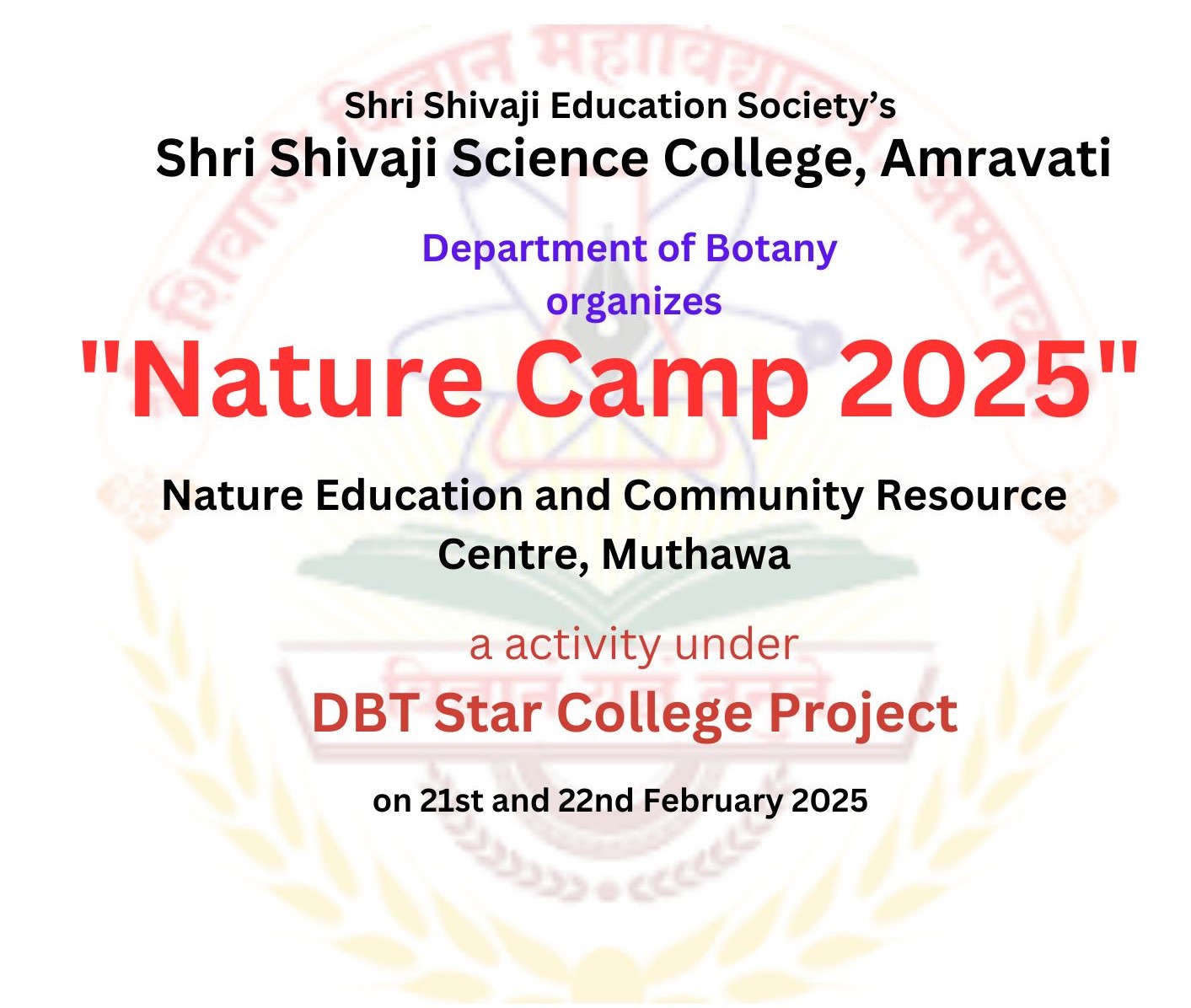
Nature Camp 2025
Activity Dates: 21.02.2025 to 22.02.2025
Type of Activity: Field Studies
Organizing Department: Department of Botany & Bioinformatics
Program Coordinators: Dr. D. D. Khedkar
Head of the Department: Dr. D. D. Khedkar
External Collaborator (if any): NO
Objectives:
- To explore the forest ecosystem, plant biodiversity, and ecological relationships.
- To identify and document medicinal, aromatic, endemic, and rare plant species.
- To develop observation, identification, and taxonomy skills among students.
- To enhance understanding of ecological conservation, sustainable resource use, and community participation in biodiversity protection.
- To foster team spirit, scientific curiosity, and a sense of environmental responsibility.
No of Beneficieries: 39
Classes Involved: BSc 1 & Locals
Venue of the Activity: Nature Education & Community Resource Centre, Muthwa
Activity Report:
1. Introduction
In line with its commitment to holistic and experiential learning, the Department of Botany, Shri Shivaji Science College, Amravati, organized a two-day Nature Camp 2025 under the DBT Star College Scheme. Held on 21st and 22nd February 2025, this educational excursion aimed at introducing first-year B.Sc. Botany students to the ecological richness of Melghat — a region known for its diverse flora, unique ecosystem, and tribal heritage.
The venue for the camp was Nature Education & Community Resource Centre, Muthawa, situated in the picturesque setting of the Melghat Tiger Reserve near Dharni. The camp was designed to blend environmental education with field-based botanical observation, providing students with first-hand experience of forest biodiversity, conservation practices, and traditional ecological knowledge.
2. Objectives of the Nature Camp
The primary goal of Nature Camp 2025 was to provide students with an immersive learning experience in a natural setting.
3. Participants and Coordination
The event saw active participation from 39 undergraduate students, accompanied and guided by four faculty members of the Department of Botany:
• Prof. Dr. D. D. Khedkar – Head of the Department
• Prof. Dr. R. C. Maggirwar
• Dr. Ankit Kale
• Supporting faculty and technical staff
The camp was enriched by the expert presence of:
• Dr. Mohnish Bokhad, Assistant Professor, Government Vidarbha Institute of Science and Humanities (GVISH), Amravati
• Mr. Manish Dhakulkar, an experienced naturalist associated with the Melghat Tiger Reserve
Their mentorship offered students unique insights into forest biodiversity and practical conservation strategies.
4. Day 1: Journey and Arrival – 21st February 2025
The day began with student assembly at 11:30 AM at the college premises, where preliminary instructions, safety guidelines, and the itinerary were explained by the faculty coordinators. At 12:30 PM, the group departed by bus towards Muthawa, passing through the scenic Satpuda landscape.
After a journey filled with excitement and anticipation, the team reached the Nature Education & Community Resource Centre, Muthawa, at around 5:00 PM. The tranquil environment and the forested surroundings set the tone for the camp's theme: “Learning through Nature.”
Students were allotted accommodation and refreshments were provided. As dusk approached, a structured evening session was conducted that included:
• Group orientation and team-building games
• Ice-breaker activities to foster communication and bonding
• Introduction to the local flora and the rules of responsible field behavior
A short documentary film on Melghat’s wildlife, flora, and conservation efforts was screened, followed by an interactive talk by Mr. Manish Dhakulkar. He shared valuable experiences of working in the Melghat forest, emphasizing the significance of wildlife corridors, forest communities, and eco-sensitive tourism.
The day concluded with a campfire-style discussion, where students expressed their excitement for the next day’s fieldwork.
5. Day 2: Field Exploration and Learning – 22nd February 2025
The second day began early, with students gathering for a guided morning trek at 6:00 AM. The trek was led by forest experts and faculty members, covering a stretch of dense deciduous forest and riverine vegetation in the buffer zone of Melghat Tiger Reserve.
Floral Diversity Observed:
During the 3-hour trek, students had the opportunity to explore and document a variety of plant species, including:
• Medicinal plants: Tinospora cordifolia (Guduchi), Withania somnifera (Ashwagandha), Adhatoda vasica (Vasaka)
• Aromatic herbs: Ocimum tenuiflorum (Holy Basil), Cymbopogon spp. (Lemongrass)
• Endemic species and seasonal wildflowers
• Climbers, shrubs, herbs, epiphytes, and parasitic plants
• Observation of soil profiles, leaf litter decomposition, and fungal colonies
Ecological Concepts Discussed:
• Forest stratification and canopy architecture
• Role of microclimates and biotic interactions
• Importance of in-situ conservation
• Introduction to Quadrat and Transect Methods of ecological study
Students were encouraged to maintain field journals, sketch notable species, and record scientific names wherever possible. The activity sharpened their skills in scientific documentation, plant morphology, and field taxonomy.
6. Academic and Interactive Sessions
After the trek and a brief rest, two engaging academic sessions were conducted:
Session 1: Forest Ecology & Biodiversity Conservation
By Dr. Mohnish Bokhad, this lecture focused on:
• Trophic levels and energy flow in ecosystems
• Threats to forest biodiversity: habitat loss, invasive species, climate change
• Importance of protected areas and community-managed forests
Session 2: Practical Botany in the Field
Led by Mr. Manish Dhakulkar, the session covered:
• Plant collection ethics
• Herbarium techniques
• Photography as a scientific tool
• Use of botanical keys and mobile apps for field identification
These sessions helped bridge theoretical knowledge with real-world application, encouraging students to explore careers in field botany, conservation science, and ecological research.
7. Student Reflections and Outcomes
A reflection session was held where students shared their personal insights, memorable moments, and scientific observations. Some recurring themes included:
• Discovery of the beauty and complexity of natural ecosystems
• Joy of identifying wild plants in their natural habitats
• Enhanced teamwork, problem-solving, and observation skills
• Motivation to protect nature, minimize pollution, and advocate for eco-conscious living
The photography competition and best-field-journal recognition added a creative and competitive spirit to the academic journey.
8. Key Learning Achievements
The Nature Camp enabled students to:
• Apply classroom knowledge in field settings
• Understand ecosystem services and human-nature interdependence
• Learn about forest conservation frameworks like Joint Forest Management
• Appreciate the interdisciplinary nature of environmental science, involving botany, ecology, sociology, and education
9. Conclusion
The Nature Camp 2025 at Muthawa was a comprehensive and impactful learning experience for the participating students. It provided an excellent platform to reinforce botanical concepts, observe forest biodiversity firsthand, and understand the socio-cultural dimensions of conservation.
By combining outdoor education with structured academic input, the camp fulfilled its aim of "learning beyond the classroom." The natural environment served as a dynamic classroom where students not only learned about plants but also developed respect for nature and sensitivity toward environmental issues.
The group safely returned to Amravati by 9:30 PM on 22nd February 2025, carrying with them field notes, photographs, and experiences that would leave a lasting impact on their academic and personal growth.
11. Acknowledgements
The Department of Botany expresses heartfelt gratitude to:
• DBT Star College Scheme for funding and support
• Principal and Management of Shri Shivaji Science College for administrative assistance
• Dr. Mohnish Bokhad and Mr. Manish Dhakulkar for their invaluable guidance
• Forest officials and local community members of Muthawa
• All faculty members and students for their enthusiasm and discipline
Outcomes:
- Enhanced Field-Based Botanical Knowledge
- Strengthened Environmental Awareness and Conservation Ethic
- Improved Scientific and Communication Skills
- Appreciation of Traditional Ecological Knowledge (TEK)
- Motivation for Further Studies and Careers in Ecology and Botany
Photos:
 Student at Nature Education & Community Resource Centre, Muthwa | 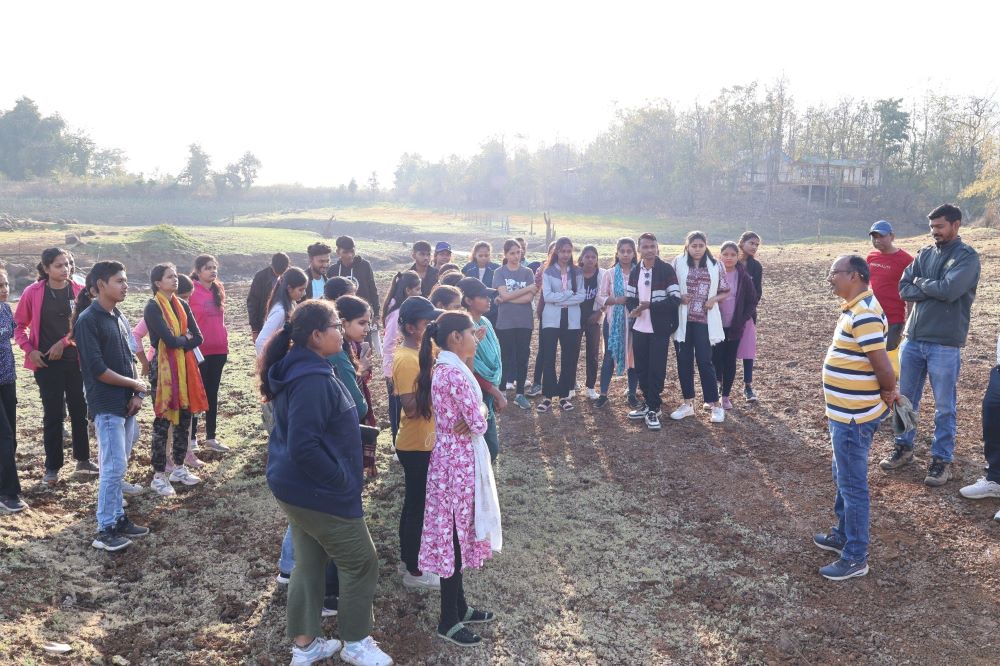 Interaction of students with the Resource Person on field |
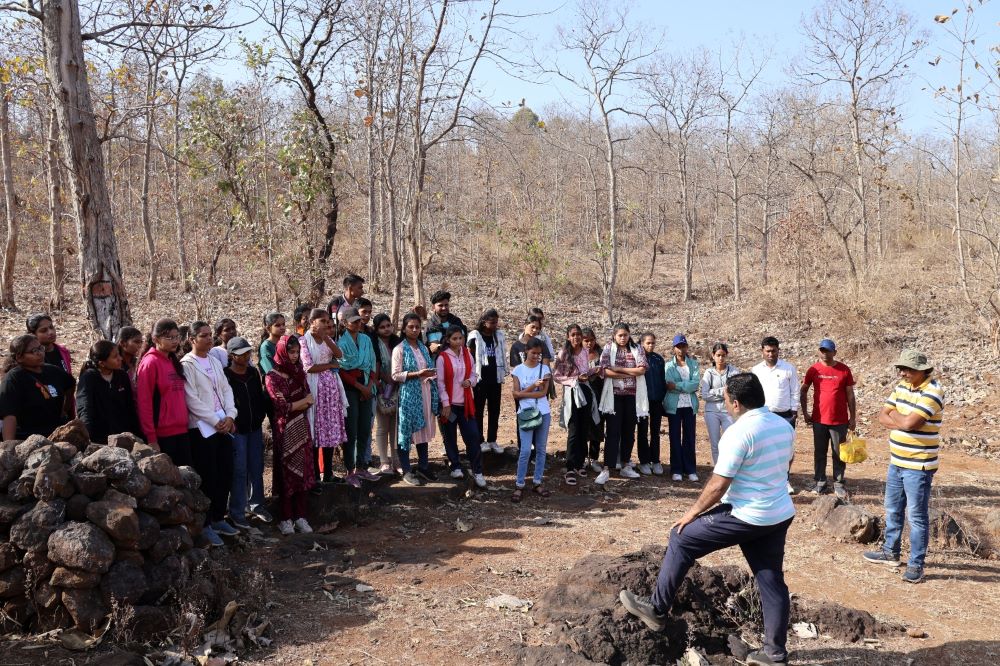 Interaction of students with the Dr. D. D. Khedkar | 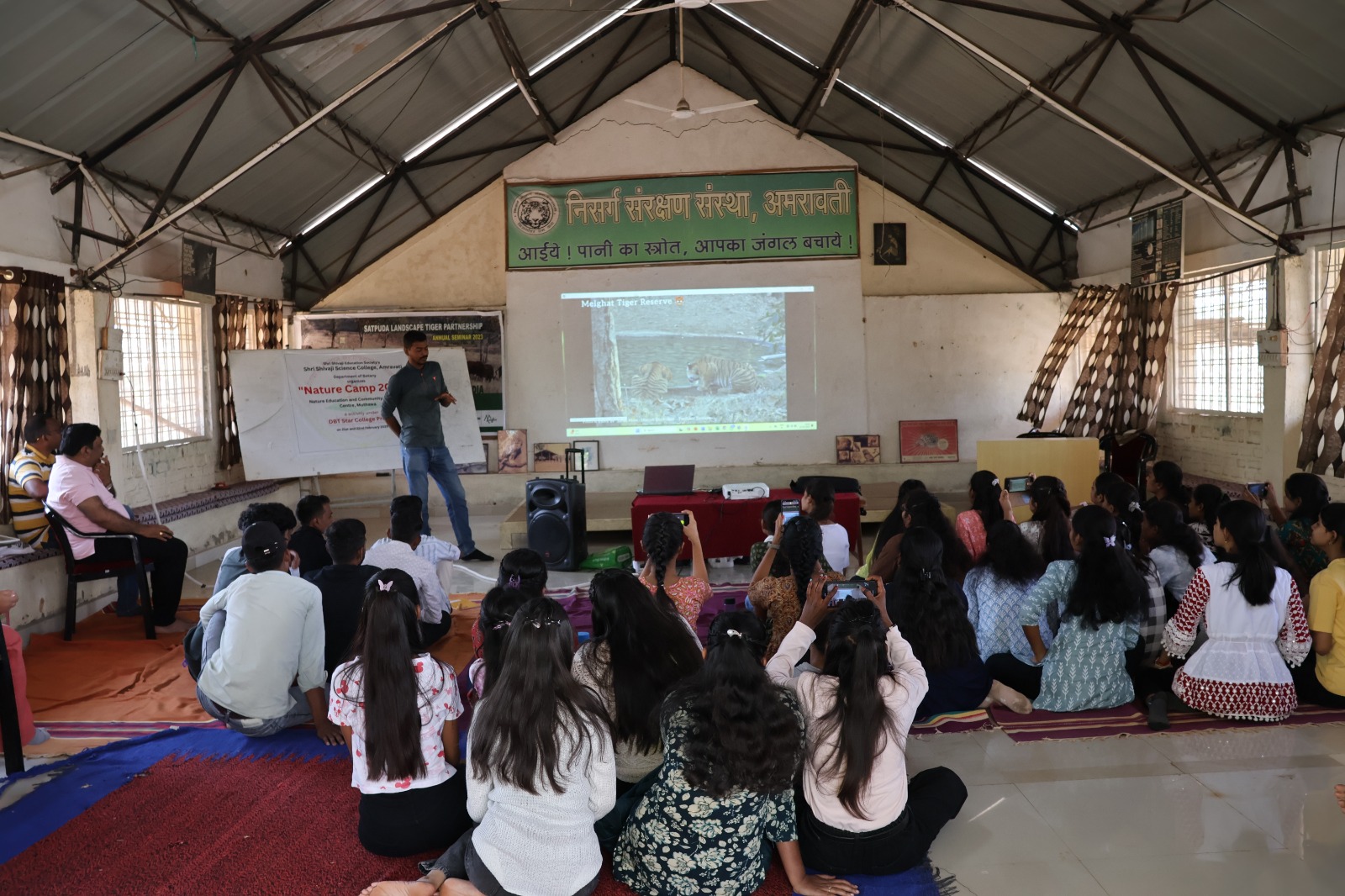 Interaction of students with the Resource Person at center |
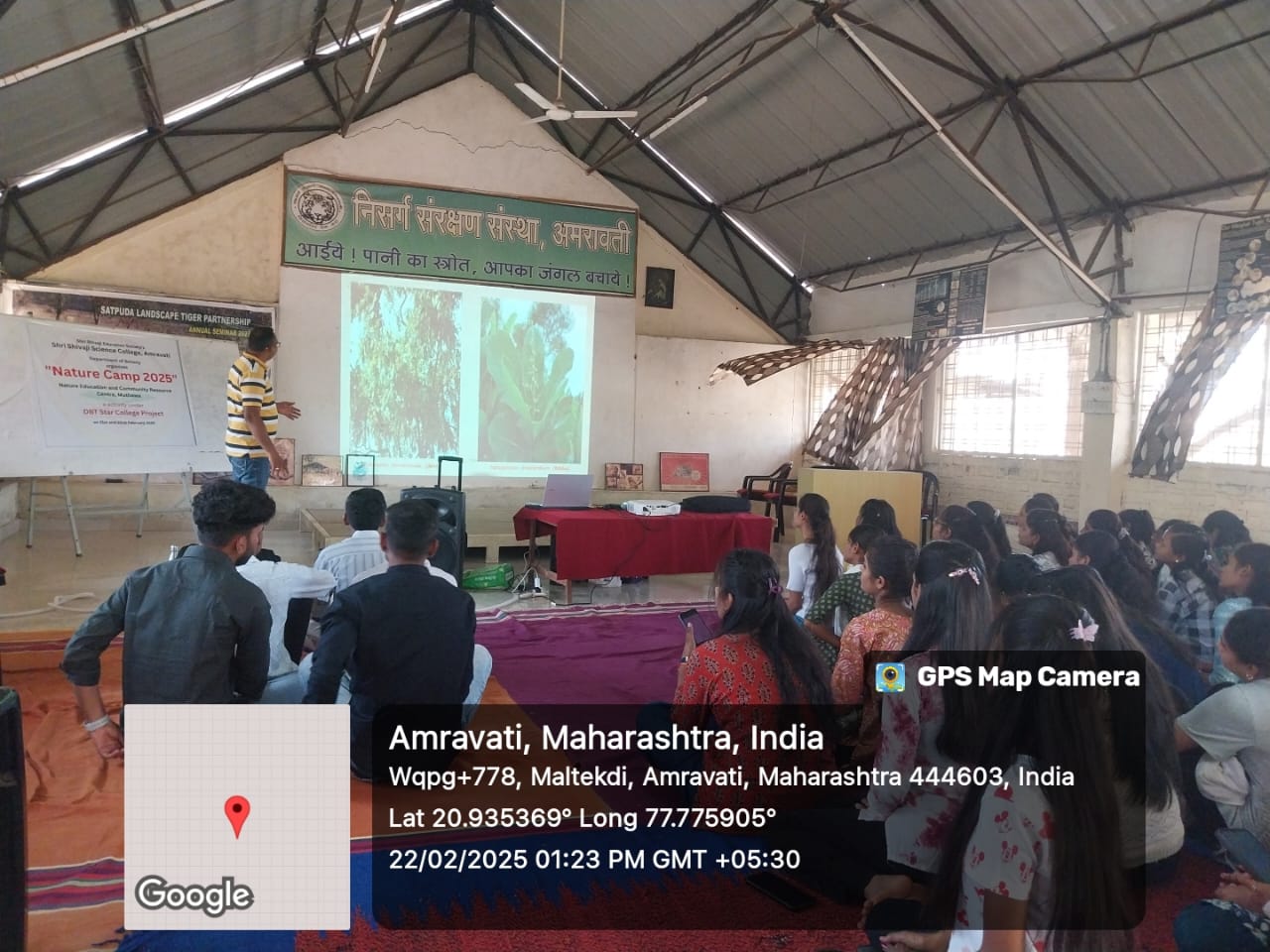 Students Learning at center via ICT | 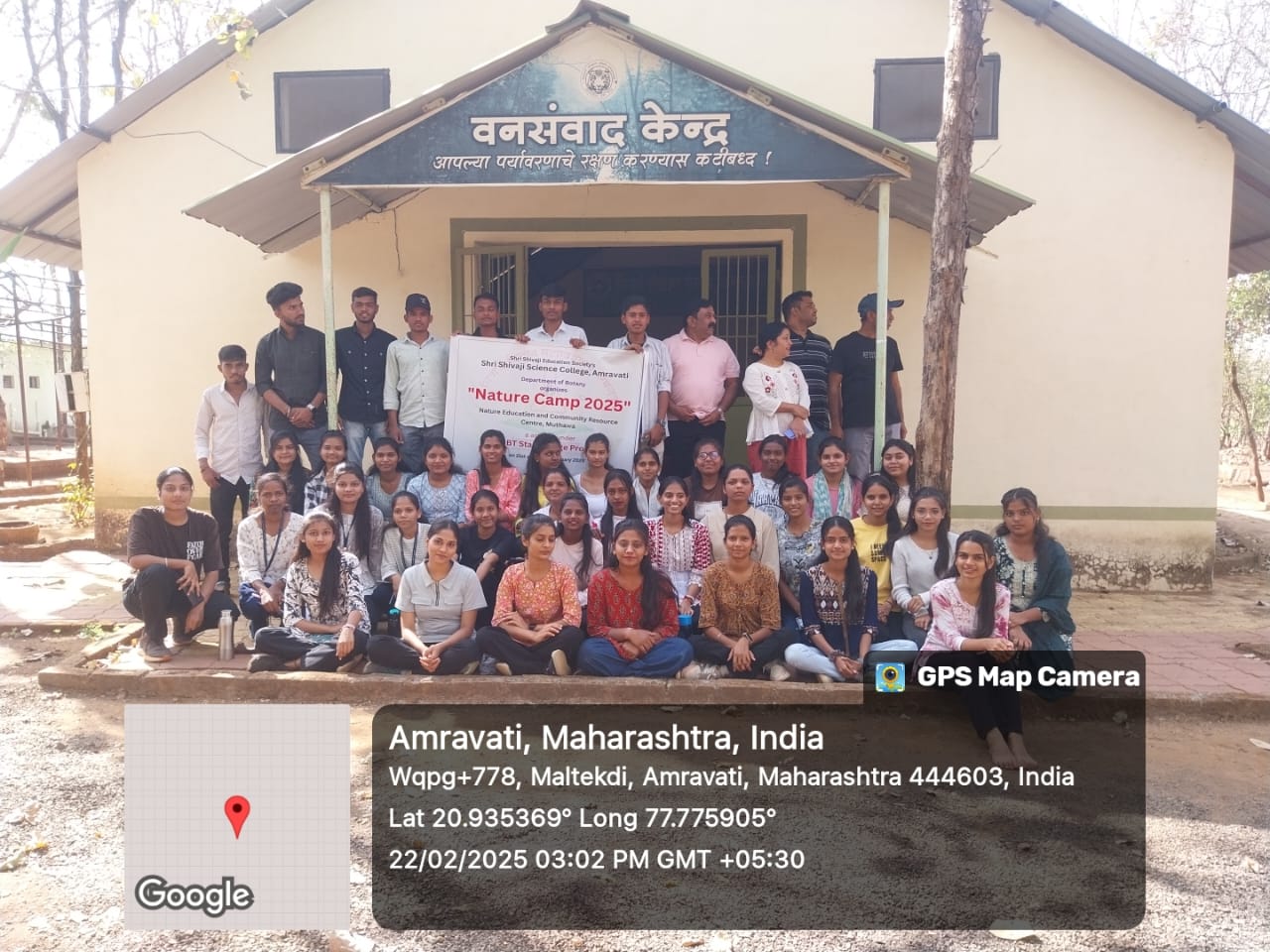 Students at Vansanwad Kendra |
Attendance Sheet:
 |
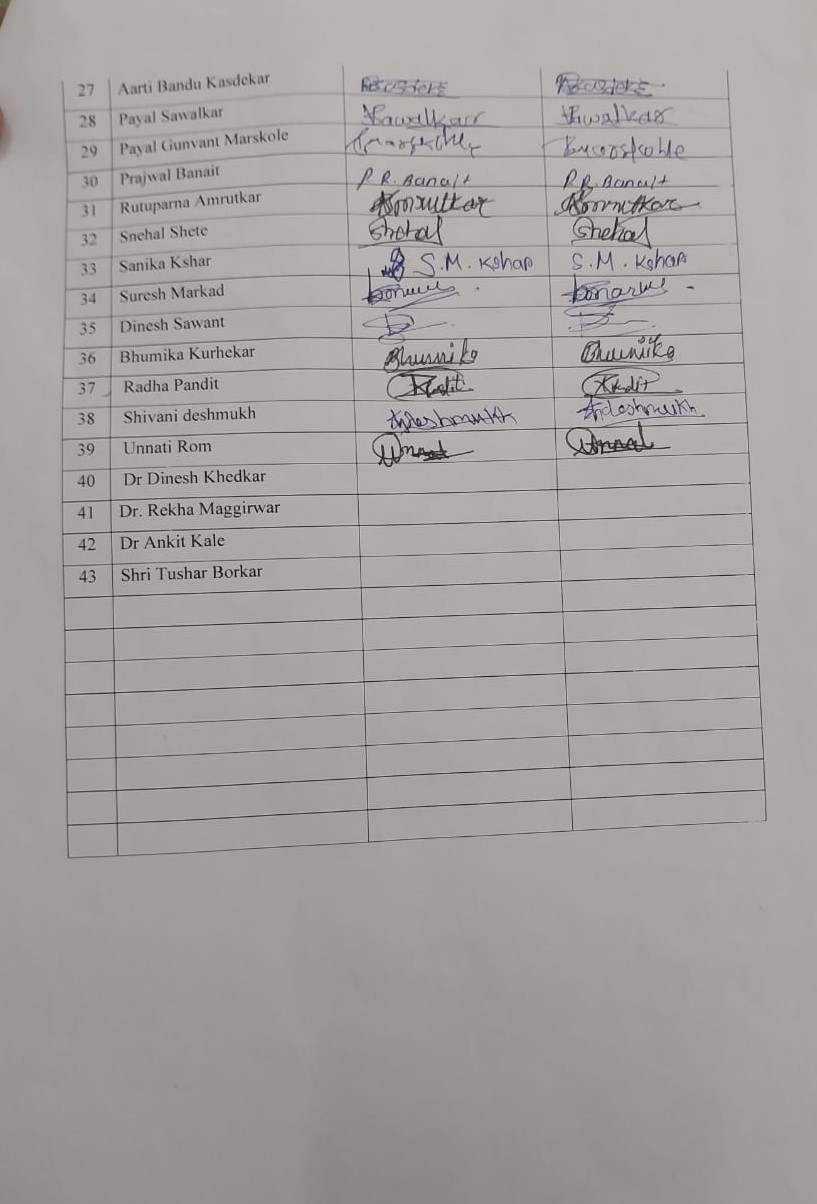 |